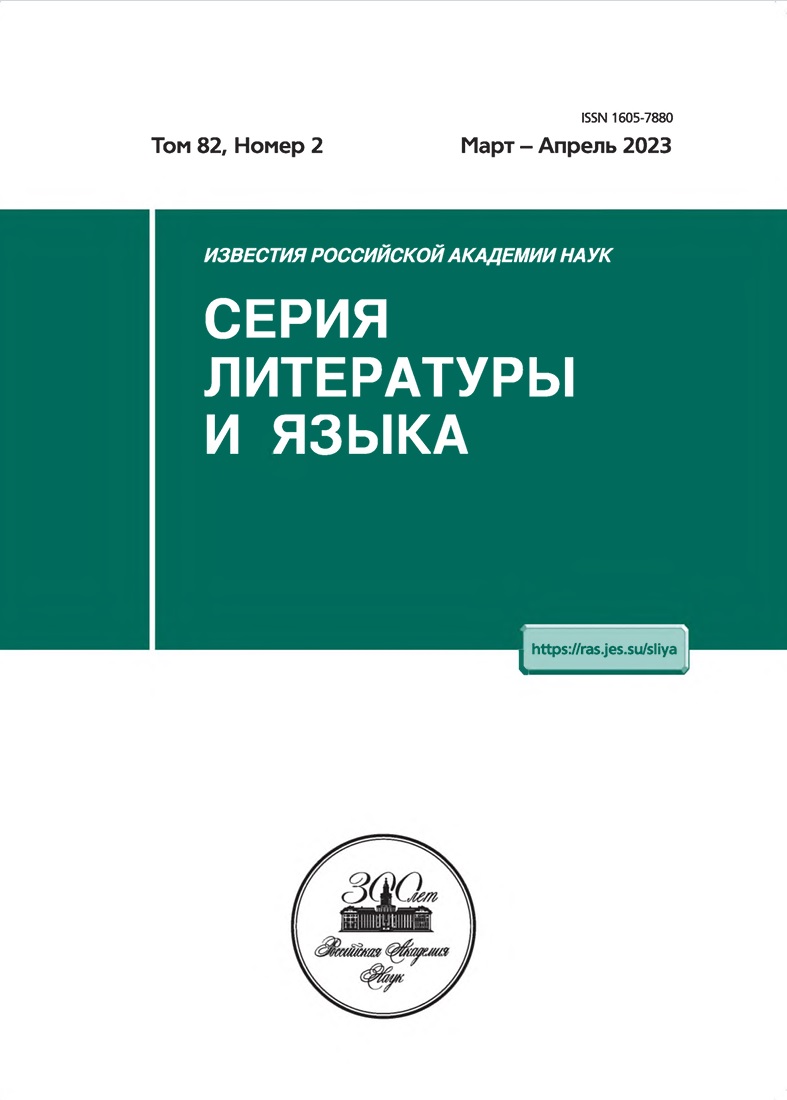Epic Word: O.-Icel. hǫll ‘hall, dwelling’ in the Elder Edda
- Authors: Toporova T.V.1
-
Affiliations:
- Institute of Linguistics of the Russian Academy of Sciences
- Issue: Vol 82, No 2 (2023)
- Pages: 63-71
- Section: Articles
- URL: https://kazanmedjournal.ru/1605-7880/article/view/656976
- DOI: https://doi.org/10.31857/S160578800025502-8
- ID: 656976
Cite item
Abstract
Multicomponent analysis of O.-Icel. hǫll ‘hall, dwelling’ in the Scandinavian epic – “The Elder Edda&8j1; – is intended to explain the principles of distribution of this lexeme and its derivatives. Statistical methods are used, taking into account the frequency of use, grammatical, describing its case paradigm, morphological, determining the types of combination of components of the composite in derivatives, syntactic, establishing relevant functions, etymological, capable of actualization in certain situations, mythological, characterizing the attraction to certain mythologems, motifs, plots or myths, poetic (alliterations, sound repetitions, anagrams) and extralinguistic, indicating a connection with the “world of things”. It can be stated that O.-isl. hǫll was used to nominate the underworld (O.-Icel.val-hǫll ‘the hall of the slain’), intended for those who died on the battlefield, and then, after association with the sky, where the dwellings of the gods, originally localized on earth, were transferred, acquired features of an ideal space, paradise, the symbol of which was the banquet hall.
About the authors
Tatyana V. Toporova
Institute of Linguistics of the Russian Academy of SciencesRussian Federation, Moscow
References
- Edda. Die Lieder des Codex Regius nebst verwandten Denkmälern. Hrsg. von Gustav Neckel. I. Text. Vierte, umgearbeitete Auflage von Hans Kuhn. Heidelberg, 1962.
- Старшая Эдда. Древнеисландские песни о богах и героях. Перевод А.И. Корсуна. Редакция, вступительная статья и комментарии М.И. Стеблин-Каменского. М.–Л., 1963.
- Гвоздецкая Н.Ю. Пролегомены к текстоцентрическому описанию семантики древнеанглийского поэтического слова / Philologica Scandinavica. Сборник статей к 100-летию со дня рождения М.И. Стеблин-Каменского. Спб., 2003. С. 28–42.
- Мифы народов мира. Энциклопедия. Том первый А – К. М., 1980. Том второй К – Я. Главный редактор С.А. Токарев. Члены редакционной коллегии И.С. Брагинский, И.М. Дьяконов, В.В. Иванов, Р.В. Кинжалов, А.Ф. Лосев, В.М. Макаревич (ответственный секретарь), Е.М. Мелетинский (заместитель главного редактора), Д.А. Ольдерогге, Б.Л. Рифтин, Е.М. Штаерман. М.: Советская энциклопедия, 1982.
- Фольклорная лексикография. Отв. ред. А.Т. Хроленко. Курск: КГПИ, 1994. Выпуск 1.
- Никитина С.Е. О многозначности, диффузии значений и синонимии в тезаурусе языка фольклора // Облик слова. Сборник статей памяти Дмитрия Николаевича Шмелёва. М., 1997. С. 360–373.
- Топорова Т.В. Принципы описания эпического слова: концепт горы в “Старшей Эддеˮ. М.: Академия гуманитарных исследований, 2006.
- Стеблин-Каменский М.И. “Старшая Эдда” // Старшая Эдда. Древнеисландские песни о богах и героях / Перевод А.И. Корсуна. Редакция, вступительная статья и комментарии М.И. Стеблин-Каменского. М.–Л., 1963. С. 181–213.
- Edda. Die Lieder des Codex Regius nebst verwandten Denkmälern / Hrsg. von G. Neckel. Bd. 2: Kurzes Wörterbuch von Hans Kuhn. Dritte umgearb. Aufl. Des Kommentierenden glossars. Heidelberg: Carl Winter Universitätsverlag, 1968.
- La Farge B., Tucker J. Glossary to the Poetic Edda. Based on Hans Kuhn’s Kurzes Wörterbuch // Skandinavistische Arbeiten hrsg. von K. von See. Bd. 15. Heidelberg, 1992.
- Cleasby R., Vigfusson G. An Icelandic-English Dictionary. Initiated by R. Cleasby; revised, enlarged and completed by G. Vigfusson. Second edition with a supplement by Sir W.A. Craigie. Oxford: Clarendon Press, 1957.
- Vries J. de. Altnordisches etymologisches Wörterbuch. Leiden, E.J. Brill, 1977.
- Смирницкая О.А. О многозначности эпического текста (Вводные замечания). Комментарий к “Гренландской песни об Атлиˮ // Эпос Северной Европы. Пути эволюции. М.: Изд.-во МГУ, 1989. С. 158–175.
- Vries J. de. Altgermanische Religionsgeschichte. Bd. II. Die Götter. Vorstellungen über den Kosmos. Der Untergang des Heidentums. Dritte, unveränderte Aufl. Berlin: Walter de Gruyter & CO, 1970.
Supplementary files










